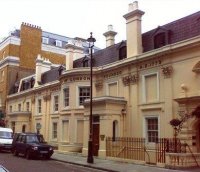| Founded | 1918 |
|---|---|
| Founder | Sir William Osler |
| Type | Educational |
| Focus | General Medicine |
| Location |
|
Area served | United Kingdom |
Key people | Donald Singer, President; Tim Nicholson, Hon. Treasurer; Wade Dimitri, Hon. Secretary, Y. Tony Yang, Trustee |
| Website | thefpmuk |

The Fellowship of Postgraduate Medicine (FPM) is a British non-profit organisation that was founded after World War I and pioneered the development of postgraduate educational programmes in all branches of medicine. [1] [2] It was founded in late 1918 as the Inter-allied Fellowship of Medicine with Sir William Osler as its president. [3] In the autumn of 1919, Osler merged the IAFM with the Postgraduate Medical Association [4] of which he had been the founding President since 1911. [5] In October 1919, Osler was appointed President of the combined Fellowship of Medicine and the Postgraduate Medical Association [6] and Sir William Osler became the first president of the new organisation. [7] The fellowship is supported by national and international fellows with expertise in the practice of medicine, medical education, clinical research, and related disciplines. The office and meeting rooms of the fellowship are in Central London. It is governed by a council that meets quarterly.